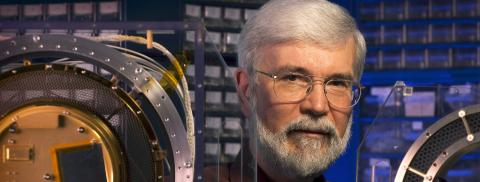
The Physics Department at UNH offers excellent research opportunities to both our graduate and undergraduate students. An overview of undergraduate research at UNH and specific examples of undergraduate students involved in research are found at the Undergraduate Research page.
More information about space related research can be found at website of the Space Science Center, a research center in the UNH Institute for the Study of Earth, Oceans, and Space.
Condensed Matter
Condensed matter physics is a vast field in contemporary physics. Not only traditional topics on solids, superconductors, magnetism, semiconductors, etc. are extensively investigated, but also modern topics on topology, entanglement, and emergent phenomena are discussed. Multidisciplinary research is vibrantly conducted, which brings together deep knowledge of theoretical physics and mathematical physics, and application perspectives from materials science and electrical engineering.
Nuclear Physics
The Department of Physics has an active and widely recognized program in Nuclear and Particle Physics. The majority of our present experimental programs is focused at Jefferson Laboratory in Newport News, Virginia, which is an international center for nuclear physics research. In addition, we are engaged in a program of fundamental physics using cold neutrons at Los Alamos and Oak Ridge national Laboratories.
Space Science
The Space Science Center fosters research and graduate education in all of the space sciences with studies ranging from the ionosphere to the Earth's magnetosphere, the local solar system, and out to the farthest reaches of the universe.
Investigations of the Earth's environment in the solar system look at space as a laboratory for plasma physics. We conduct theoretical and satellite investigations of the solar-terrestrial radiation environment. High energy astrophysics investigations involve the sensing of energetic astrophysical objects with ground, balloon, and satellite detectors.
More information about space related research can be found at website of the Space Science Center, a research center in the UNH Institute for the Study of Earth, Oceans, and Space.
Undergraduate Research
The first step to joining a research group is finding out what positions are available. The UNH research groups often have openings for undergraduates. Feel free to contact any of the professors to discuss opportunities available in their groups; simply email them, and let them know that you are a physics undergrad interested in doing research. Talk with upper classmen to find out what research they are doing and how they got started.
